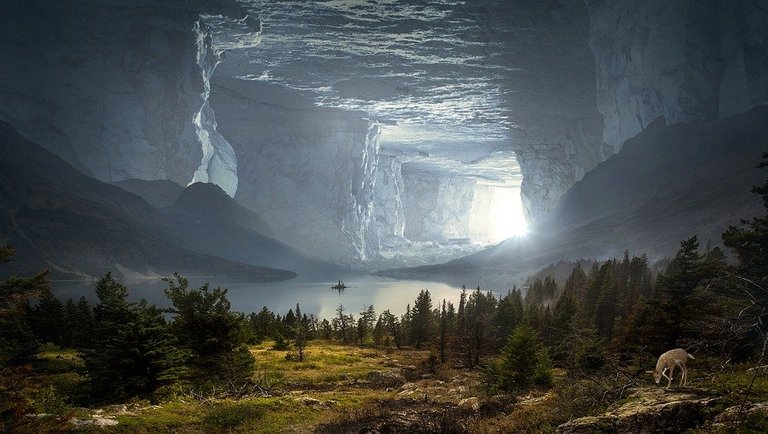Do we know what kind of genre we write...? | ¿Sabemos qué tipo de género escribimos…? [Eng/Esp]
(Edited)

Fuente imagen
TEXT IN ENGLISH
As a result of several previously published stories, I felt the need to try to classify these writings, since at the beginning I wrote them without thinking much about these writing and literary aspects. This led me to take a little journey through the vast world of literary genres.
Generally, literary productions are broadly classified into: fiction (novels, stories, legends and myths) and non-fiction (poetry, essays, chronicles, among others), and then there are a series of combinations found between these two large groups.
It is assumed that there are literary productions that do not need to be classified because their characteristics are already implicit in a specific genre, but perhaps thinking like this is not only a mistake, but it could also take away originality and literary flight from our writing.
It is convenient to clarify that there are genres and what many call sub-genres. The truth is that more and more combinations of these are being used in written works or film productions based above all on novels.
For example, among many of the combinations of genres we have: science fiction, magical realism as established classes. But we have a series of sub-genres that will depend on the lesser or greater fantasy that we introduce in these texts.
To mention the most important ones are: Historical fantasy (narrates elements of our history, but adds fantastic elements to it), Ucronía fantástica (The fantastic elements make the story altered or different from how we know it). These with reference to history.
Other sub-genres include: parallel worlds (co-existence of worlds parallel to our own), paranormal fantasy (ghosts and apparitions), urban fantasy (the events take place in a city and the fantastic beings are camouflaged among normal people). Many series based on books have exploited these themes.
We close our tour through some of the literary sub-genres by referring to science fantasy: which differs from science fiction because many of the elements it contains cannot be explained by logic.
Hopefully this simple post will help you, as it did me, to know how to place our literary productions within a genre or sub-genre or why not to create others. That will depend on our imaginative and creative potential.
TEXTO EN ESPAÑOL
¿A raíz de varias historias publicadas con anterioridad, tuve la inquietud de intentar clasificar esos escritos, ya que en un principio los escribí sin pensar mucho en esos aspectos escriturales y literarios. Esto me llevó a realizar un pequeño recorrido por el vasto mundo de los géneros literarios.
Por lo general, las producciones literarias se clasifican a groso modo en: ficción (novelas, cuentos, leyendas y mitos) y no ficción (poesía, ensayo, crónica entre otros), después están una serie de combinaciones que se encuentran entre estos dos grandes grupos.
Se supone, que hay producciones literarias que no necesitan ser clasificadas porque ya por sus características están implícitas en un género específico, pero quizá pensar así, no solo sea un error, sino que además le podría quitar originalidad y vuelo literario a nuestro escrito.
Es conveniente aclarar que hay géneros y lo que muchos llaman subgéneros. Lo cierto es, que cada vez se utilizan más combinaciones de estos dentro de las obras escritas o producciones cinematográficas basadas sobre todo en novelas.
Por ejemplo, entren muchas de las combinaciones de géneros tenemos: la ciencia ficción, el realismo mágico como clases ya establecidas. Pero tenemos una serie de subgéneros que van a depender de la menor o mayor fantasía que introduzcamos en estos textos.
Por mencionar los más importantes están: La fantasía histórica (narra elementos de nuestra historia, pero le añade elementos fantásticos), Ucronía fantástica (Los elementos fantásticos hacen que la historia sea alterada o diferente a como la conocemos). Estos con referencia a la historia.
Entre otros subgéneros tenemos: los mundos paralelos (coexistencia de mundos paralelos al nuestro), la fantasía paranormal (fantasmas y aparecidos), la fantasía urbana (los hechos ocurren en una ciudad y los seres fantásticos están camuflados entre la gente normal). Muchas series basadas en libros han explotado esas temáticas.
Cerramos nuestro recorridos por algunos los subgéneros literarios, haciendo referencia a la fantasía científica: que se diferencia de la ciencia ficción, porque muchos de los elementos que contiene no pueden ser explicados por la lógica.
Ojalá este sencillo post, les sirva como a mí, para saber ubicar nuestras producciones literarias dentro de un género o subgénero o porque no para crear otros. Eso va a depender de nuestro potencial imaginativo y creativo.
Translated with www.DeepL.com

¡Gracias por pasarte hasta pronto!
0
0
0.000
0 comments